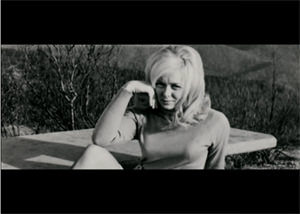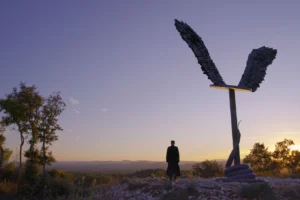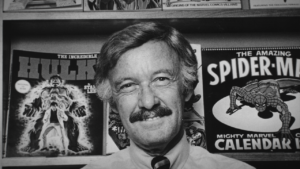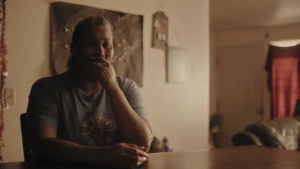‘Tabloid’: Errol Morris’ Lunatic Love Story
Morris' film has a giddy quality. But, essentially, he is trying to keep a straight face amid the chaos he is recounting. Come right down to it, what could a filmmaker add to this story by striking attitudes toward the events he recounts? Strange are the ways of love—not to say, in some cases, totally weird.
Strange are the ways of love—not to say, in some cases, totally weird.
Sometime in 1977 an attractive, if curiously intense, woman named Joyce McKinney conceived a mad passion for a young man, a Mormon, who was then doing his obligatory duty as a church missionary in England. There appears to be nothing extraordinary about this fellow—except in Joyce’s besotted eyes.
Practically speaking, she came to believe that if only they could enjoy sexual congress, his indifference—or perhaps it was a matter of radical innocence—would cause the scales to fall clanging from his eyes. So off she flew to the United Kingdom, where she abducted him to a country cottage. And, in effect, raped him repeatedly over the course of a few days. This, of course, sounds improbable, though apparently it is possible in ways that are not entirely made clear in Errol Morris’ lunatic, fascinating and appropriately entitled documentary “Tabloid,” the true subject of which is not the eerily cheerful Joyce McKinney, but the lowlife British press’ response to her story.
For, yes, it got on to her story and rode it for all it was worth, which was plenty in terms of newsstand sales. Eventually, she served jail time for her escapade, though that was, in her eyes at least, a small price to pay for the fame she achieved. Maybe her celebrity was fleeting, but it was intense—a perfect storm of cheesy notoriety that to this day resonates in those circles that treasure journalistic excess over sober, reliable reporting about foreign affairs.
The endlessly chipper Joyce does not, to this day, see that she did anything wrong. As she sees it, she was simply a woman caught up in a grand passion and doing what she had to do to realize her romantic dream. Sometimes, reluctantly, ironically, we see her point. I mean, no human animals were harmed in the making of this story—except, possibly, the object of her strenuous affections. And even he must have had a certain amount of dubious pleasure in the course of their encounter.
About that Morris has nothing to say. His film has a giddy quality, especially when Joyce is holding forth. But, essentially, he is trying to keep a straight face amid the chaos he is recounting. Come right down to it, what could a filmmaker add to this story by striking attitudes toward the events he recounts? In recent years, with films such as “The Fog of War” and “Standard Operating Procedure,” Morris has earned a deserved reputation as a sober and reliable reporter on very important people and events in the public sphere. But he has always had a taste for the outré; you have to remember that his very first film was about a pet cemetery. And that the best thing about these seemingly “minor” efforts is that he does not make overt comments on the vagaries of his subjects. He simply sits back and lets them tell their stories. It’s up to us, in the audience, to supply whatever opinions we may have about their strange behavior. The effect, finally, is to create a sort of “there but for the grace of God …” attitude in us. We have to admit the possibility that, in certain circumstances, we too can fall off rationalism’s table, give in, without entirely recognizing it, to really stupid passions that are harmful to us and to others.
In the particular case of Joyce McKinney, we find her now still convinced of the rightness of her cause, still pleased with the long-ago fuss she stirred. And involved with a Korean scientist who is cloning the beloved dog who has been the devoted companion of her late years. Her saving grace is an innocence that is impervious to absurd reality, to the idea that there is something the least bit questionable about the way she has lived her life. If she has any dark nights of the soul, she’s not talking about them. And Morris is not asking about them. It is enough for him, and for us, to appreciate and forgive the extremes of her life — and to more or less appreciate the fact that they could happen to any of us.
Your support matters…Independent journalism is under threat and overshadowed by heavily funded mainstream media.
You can help level the playing field. Become a member.
Your tax-deductible contribution keeps us digging beneath the headlines to give you thought-provoking, investigative reporting and analysis that unearths what's really happening- without compromise.
Give today to support our courageous, independent journalists.






You need to be a supporter to comment.
There are currently no responses to this article.
Be the first to respond.